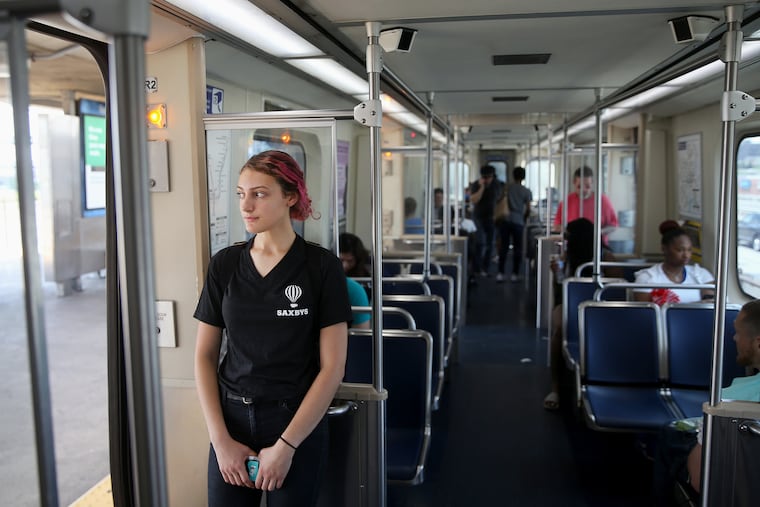Fewer teens are getting their drivers’ licenses
Fewer and fewer teens are getting their drivers' licenses every year, studies show. The reasons vary, but come down to opportunity, cost, and motivation.

Kristen Adamczyk, 20, does not have a driver's license or a learner's permit. She grew up in Philadelphia's Port Richmond neighborhood and didn't need a car to get around.
In high school, Adamczyk took the bus and subway, using the free SEPTA TransPasses her school provided. Now, an incoming junior at Temple, she travels primarily by SEPTA or on foot, although she also bikes and uses Uber.
"I don't really feel like I need [a license]," Adamczyk said. "When I'm traveling around the city, it's more convenient to not have a car."
Adamczyk's sister, Jill, 23, never got her license, either. She uses SEPTA to get to her job in Center City.
The Adamczyks represent a larger trend among young adults in the United States who delay — or choose to forgo — getting their driver's license. The percentage of 16-year-olds nationwide with a license decreased from 46.2 percent in 1983 to 24.5 percent in 2014, according to a 2016 study by the University of Michigan. Thirty years later, almost half as many 16-year-olds are getting a license.
In Pennsylvania, teens must be at least 16 to get a learner's permit. They can get their license after having the permit for six months.
From the end of 2016 to the end of 2017, the number of licensed 16-year-olds in Pennsylvania barely budged by just 402 drivers, according to data provided by the Pennsylvania Department of Transportation.
In New Jersey, where teens can also get their learners' permits at 16 but must wait until 17 to get a license, the number of 17-year-olds with licenses decreased by more than 5,000 from 2007 to 2016, according to the New Jersey Motor Vehicle Commission.
Some young people say they just don't need a car or the hassle. But others, psychologists say, worry about accidents – and other things.
"Oftentimes, it's a fear for safety," said Cami Winkelspecht, clinical director of psychology at the Nemours/Alfred I. duPont Hospital for Children. "In my experience, a fear of driving isn't an isolated fear. You're anxious about other things, as well. … If you have a child toward the anxious end, the responsibility [of driving] can be a lot."
For new drivers, safety is a reasonable concern.
Motor-vehicle accidents are the leading cause of death for teens, according to the Insurance Institute for Highway Safety.
In 2016, there were 2,820 motor-vehicle fatalities among teenagers, according to IIHS data. The fatal crash rate per mile driven by teens is nearly three times the rate for drivers ages 20 and over, and the rate for 16- and 17-year-olds is almost twice the rate for drivers 18 and 19 years old.
"Age is highly associated with how rapidly people can learn things that are complex and are influenced by general experience," said Bruce Gordon Simons-Morton, senior investigator at the National Institute of Child Health and Human Development. "Older novices tend to be more mature and have other experiences that they can bring to the driving context that allow them to learn more quickly."
Simons-Morton advocates for delaying licensure. He did not allow his children to get their learners' permits until they were 17 because of his concerns for their safety.
"I think perhaps the single most important public health policy for reducing young driver crashes would be to delay licensure to 18," Simons-Morton said.
Fear didn't stop Ruby Garden, 18, who couldn't wait to get her learner's permit when she turned 16. After failing her driver's test twice, she passed on the third try and got her license a few months before her 17th birthday.
Garden, who lives in Bella Vista, doesn't drive often. She bikes to her job at a private swim club about a mile from her house. But she saw getting her license as "a rite of passage, the next step in ensuring the independence I wanted at the time."
She admitted she sometimes feels nervous behind the wheel when she is carrying a lot of passengers. In fact, Pennsylvania law limits the number of passengers young drivers can transport when they first get their licenses, recognizing that the added distraction of passengers complicates driving.
After her high school graduation, Garden drove her friends 2½ hours to the Poconos for senior week. There were four other people in the car, and they were talking and playing music.
"There was a moment of feeling spooked by that. I do have the responsibility of getting all these people to that point safely," Garden said.
To help teens combat their fears, Winkelspecht recommends gradual exposure to driving, beginning in their own neighborhood with their parents – as long as the parents aren't also overly nervous.
"I've had many conversations with parents who are very stressed," Winkelspecht said. "I think having a plan, talking about it, and understanding what your child's fears and thoughts are about it is important."
Winkelspecht, a mother of two kids aged 10 and 4, plans to start talking to her children about driving when they turn 15.
"It's just another one of those tasks of development," Winkelspecht said. "It has to happen at some point and figuring out at what point is important."